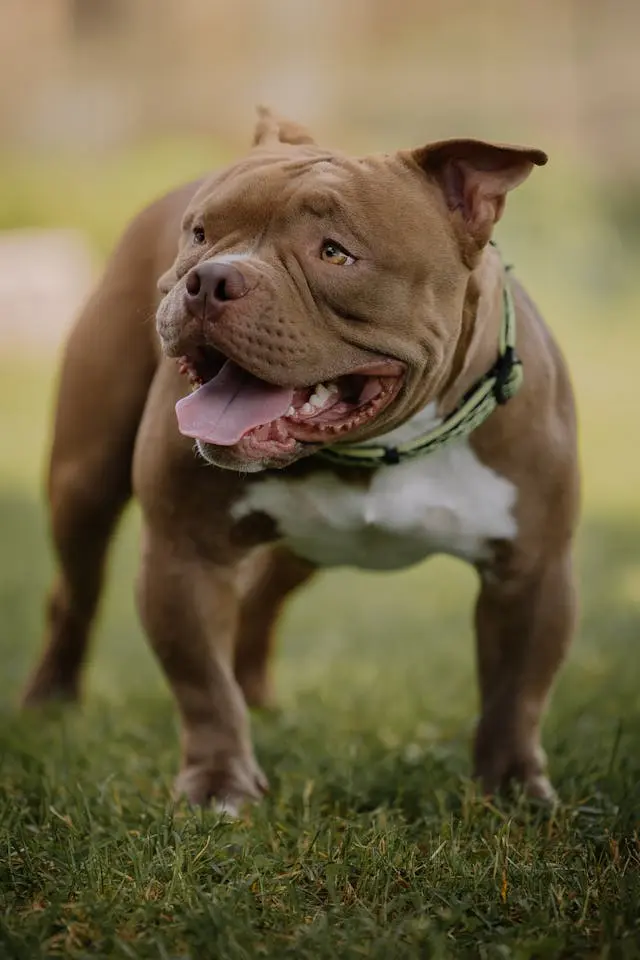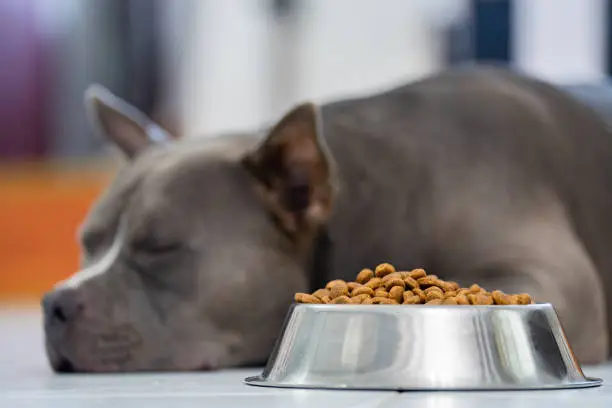
Table of Contents
Introduction: Good Dog Food for Pitbulls
Pitbulls are strong, energetic dogs that require a well-balanced diet to maintain their health and muscle mass. Choosing good dog food for Pitbulls is essential to support their high energy levels, strong bones, and overall well-being. Without proper nutrition, Pitbulls may suffer from digestive issues, allergies, or even obesity.
Did you know that Pitbulls need a diet rich in high-quality protein to sustain their powerful muscles? Unlike some dog breeds, they also require healthy fats and essential nutrients to keep their coats shiny and their joints strong. But with so many options available, how do you know which dog food is the best choice?
In this guide, we will explore everything you need to know about good dog food for Pitbulls, including the best ingredients, feeding schedules, and top food brands to keep your Pitbull happy and healthy.
Nutritional Needs of Pitbulls: Good Dog Food for Pitbulls
Providing good dog food for Pitbulls means ensuring a well-balanced diet with the right mix of protein, fats, and carbohydrates. Pitbulls are muscular and highly active dogs, so their diet should support their energy levels and overall health.
1. Protein, Fat, and Carbohydrate Requirements
Protein (40-50%): Pitbulls need a high-protein diet to maintain their strong muscles. Look for foods with real meat sources like chicken, beef, salmon, or lamb. Avoid low-quality protein fillers like meat by-products.
Fats (15-25%): Healthy fats provide energy and support skin and coat health. Good sources include fish oil, chicken fat, and flaxseed oil.
Carbohydrates (20-30%): Pitbulls don’t require high amounts of carbs, but complex carbs like sweet potatoes, brown rice, and vegetables provide fiber and sustained energy.
2. Importance of Vitamins and Minerals
A balanced diet for Pitbulls should include essential vitamins and minerals to support their immune system, bones, and digestion:
Calcium & Phosphorus: Strengthen bones and teeth.
Omega-3 & Omega-6: Promote a shiny coat and healthy skin.
Vitamin E & C: Support immune function.
3. Foods to Avoid
Not all foods are safe for Pitbulls. Avoid:
Excessively fatty foods (can cause obesity and pancreatitis).
Artificial additives and preservatives.
Toxic vegetables like onions, garlic, and raw potatoes.
Chocolate, grapes, and dairy (can cause digestive issues).
Choosing good dog food for Pitbulls means selecting high-quality, natural ingredients that provide the right balance of nutrients for a strong and healthy dog.
Best Types of Dog Food for Pitbulls: Good Dog Food for Pitbulls
Choosing the best type of dog food for Pitbulls depends on their dietary needs, lifestyle, and health conditions. Below are the four main types of good dog food for Pitbulls, along with their benefits and drawbacks.
1. Dry Kibble (Best for Everyday Feeding)
Benefits:
Convenient and affordable.
Supports dental health by reducing plaque and tartar buildup.
Long shelf life.
Recommended Brands:
Blue Buffalo Wilderness (high in protein, grain-free).
Taste of the Wild (real meat, essential fatty acids).
Wellness CORE Grain-Free (rich in protein and Omega-3).
Dry kibble is a great everyday choice for Pitbulls, especially when it contains high-quality animal protein and no artificial fillers.
If you’re also considering other breeds, like the German Shepherd, make sure to check out our article on Best Dog Food for German Shepherds – Top Picks for a Healthy Diet, where we discuss the best options for their unique dietary needs as well.
2. Wet Food (For Hydration & Picky Eaters)
When & Why to Use It:
Good for Pitbulls who don’t drink enough water.
Helps with digestion and is easier to chew.
Enhances taste for picky eaters.
Recommended Brands:
Merrick Grain-Free Wet Food (real meat and vegetables).
Nutro Ultra Grain-Free (high in protein, no fillers).
Wet food is nutritious but more expensive and should be mixed with dry kibble for a balanced diet.
3. Raw Diet (For Muscle Growth & High Energy)
Pros:
Provides natural, unprocessed nutrients.
Helps build lean muscle.
Can improve coat health and digestion.
Cons & Precautions:
Risk of bacterial contamination (e.g., salmonella).
Needs careful nutrient balance to avoid deficiencies.
Requires proper storage and preparation.
Some Pitbull owners swear by the BARF (Biologically Appropriate Raw Food) diet, which includes raw meat, bones, and organ meats. If choosing this option, consult a veterinarian for safety.
4. Homemade Food (For Full Control Over Ingredients)
Examples & Tips:
Lean protein (chicken, turkey, beef).
Healthy carbs (sweet potatoes, brown rice).
Vegetables (spinach, carrots, pumpkin).
Omega-3 sources (fish oil, flaxseeds).
Cooking homemade meals ensures high quality ingredients and avoids harmful additives. However, it requires time, effort, and expert guidance to ensure a balanced diet.
Which Type is Best?
The best good dog food for Pitbulls depends on their specific needs. Many owners use a combination of dry kibble and wet food, while others prefer homemade or raw diets with proper supervision.
Top 5 Recommended Dog Foods for Pitbulls: Good Dog Food for Pitbulls
Selecting good dog food for Pitbulls is essential to keep them strong, healthy, and full of energy. Below are the top five best dog food brands for Pitbulls, based on high-quality ingredients, protein content, and overall health benefits.
1. Blue Buffalo Wilderness High Protein

High in real meat protein for muscle growth.
Grain-free formula for better digestion.
Contains Omega-3 & Omega-6 for healthy skin and coat.

Deboned chicken
Peas & sweet potatoes (healthy carbs)
Flaxseed (rich in Omega-3)

2. Taste of the Wild High Prairie Canine

Uses novel proteins (bison & venison) to reduce allergies.
Grain-free with natural probiotics for digestion.
Includes fruits and vegetables for vitamins & antioxidants.

Roasted bison & venison
Peas, sweet potatoes & blueberries
Salmon oil (rich in DHA & EPA)

3. Wellness CORE Grain-Free High-Protein

34% high-quality animal protein for strong muscles.
Supports heart health with taurine.
No artificial preservatives or fillers.

Deboned turkey & chicken meal
Lentils & spinach (fiber & vitamins)
Salmon oil (healthy fat & DHA)

4. Orijen Original Dry Dog Food

85% animal ingredients (great for active Pitbulls).
Mimics a raw diet with fresh meat, organs, and cartilage.
Supports strong joints & bones.

Free-run chicken & turkey
Wild-caught flounder
Whole eggs & lentils

5. Bully Max High-Performance Dog Food

Designed specifically for Pitbulls & active breeds.
30% protein & 20% fat for muscle building.
Contains no corn, soy, or wheat.

Chicken meal (high protein source)
Brown rice (digestible carbohydrate)
Flaxseed (rich in Omega-3)

Which One is Best?
Each of these brands offers good dog food for Pitbulls, depending on your dog’s needs:
For muscle growth: Bully Max or Orijen.
For sensitive stomachs: Taste of the Wild.
For overall health: Blue Buffalo or Wellness CORE.
Always consult a veterinarian before making a diet change. A high-protein, balanced diet will help keep your Pitbull healthy and active!

Feeding Schedule and Portion Sizes: Good Dog Food for Pitbulls
Proper feeding is crucial for maintaining a Pitbull’s health and energy levels. Good dog food for Pitbulls should be paired with an appropriate feeding schedule and portion sizes based on their age, weight, and activity level.
1. How Often to Feed a Pitbull
Pitbulls should be fed 2-3 times a day, depending on their age and activity level:
-
Puppies (8 weeks to 6 months): Feed 3 meals per day to support rapid growth and energy needs.
-
Adult Pitbulls (6 months and older): Feed twice daily for consistent energy and digestion.
-
Senior Pitbulls (7+ years): They may require slightly fewer meals, depending on their activity levels, but generally twice a day is still best.
2. Recommended Portions by Age and Weight
Portion sizes vary based on weight and activity level. Here are general guidelines:
-
Puppies:
-
8-12 weeks: 1-2 cups per meal.
-
3-6 months: 2-3 cups per meal.
-
6-12 months: 3-4 cups per meal.
-
-
Adult Pitbulls:
-
30-50 lbs: 2-3 cups per meal.
-
50-70 lbs: 3-4 cups per meal.
-
70+ lbs: 4-5 cups per meal.
-
-
Senior Pitbulls may need slightly smaller portions depending on their metabolism and activity level.
3. Signs of Overfeeding or Underfeeding
-
Overfeeding:
-
Obesity (excessive weight gain).
-
Lethargy or a lack of energy.
-
Loose stools or diarrhea (from too much food or high-fat content).
-
-
Underfeeding:
-
Weight loss or visible ribs.
-
Lack of energy or sluggishness.
-
Dull coat or dry skin.
-
Monitoring your Pitbull’s weight and energy levels will help you adjust portion sizes as needed. Always check with a veterinarian for a personalized feeding plan, especially if you notice any unusual signs.

Common Pitbull Health Issues Related to Diet: Good Dog Food for Pitbulls
While good dog food for Pitbulls can help maintain their health, an improper diet can lead to various health issues. Below are common health problems linked to diet:
1. Food Allergies
Pitbulls can suffer from food allergies, which often result in itchy skin, ear infections, or digestive upset. Common allergens include grains, chicken, beef, and artificial additives. If your Pitbull shows signs of allergies, switching to a hypoallergenic or grain-free food may help alleviate symptoms. Always consult a veterinarian for allergy testing.
2. Digestive Problems
Pitbulls are prone to gastric issues such as bloating, diarrhea, and constipation. These problems may arise from poor-quality ingredients, too much fat, or an imbalance of fibers in their diet. Choose easily digestible foods that include prebiotics and probiotics, which support gut health and improve digestion. Avoid overfeeding or changing diets abruptly, as this can also upset their stomach.
3. Obesity and Malnutrition
Pitbulls have a strong muscular frame, but without proper portion control, they can easily become overweight. Obesity leads to joint problems, heart disease, and diabetes. On the flip side, malnutrition can occur if they are fed low-quality food that lacks essential nutrients. It’s crucial to measure portions carefully and ensure they get a balanced diet with enough protein, healthy fats, and vitamins.
Proper feeding can prevent many of these common health issues and keep your Pitbull in top condition!
Conclusion: Good Dog Food for Pitbulls
A good diet is vital for maintaining a healthy, energetic, and strong Pitbull. Providing high-quality food that meets their nutritional needs ensures proper muscle development, digestion, and overall well-being. Regularly monitoring your Pitbull’s health and adjusting their diet as needed can help prevent common health issues like obesity, allergies, and digestive problems.
Always consult a veterinarian for personalized advice, especially if you’re uncertain about what food is best for your Pitbull. They can help guide you toward the most suitable diet plan based on your dog’s age, weight, and specific health needs.
What’s your Pitbull’s favorite type of food, and how has it affected their health? Share your experiences below!
